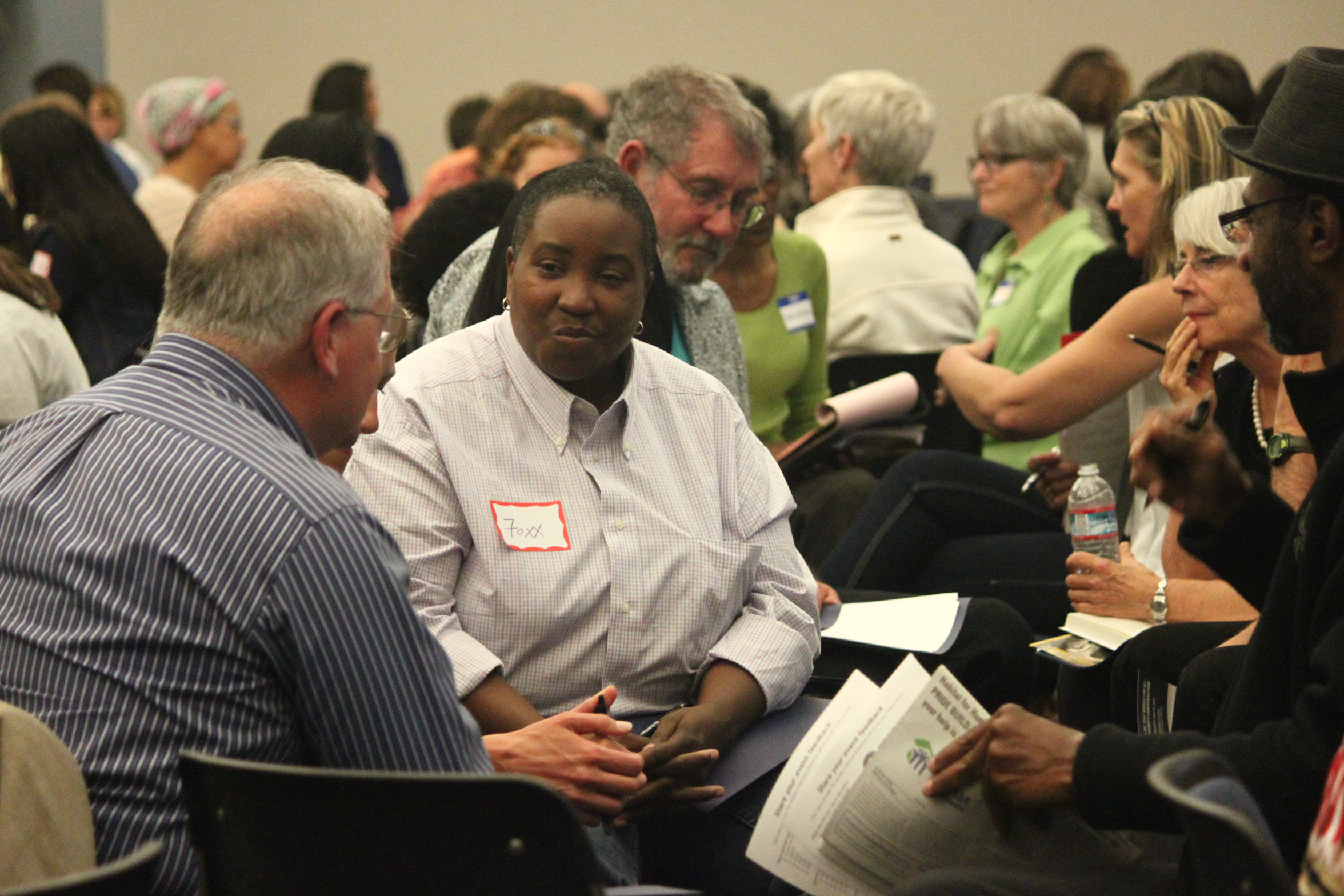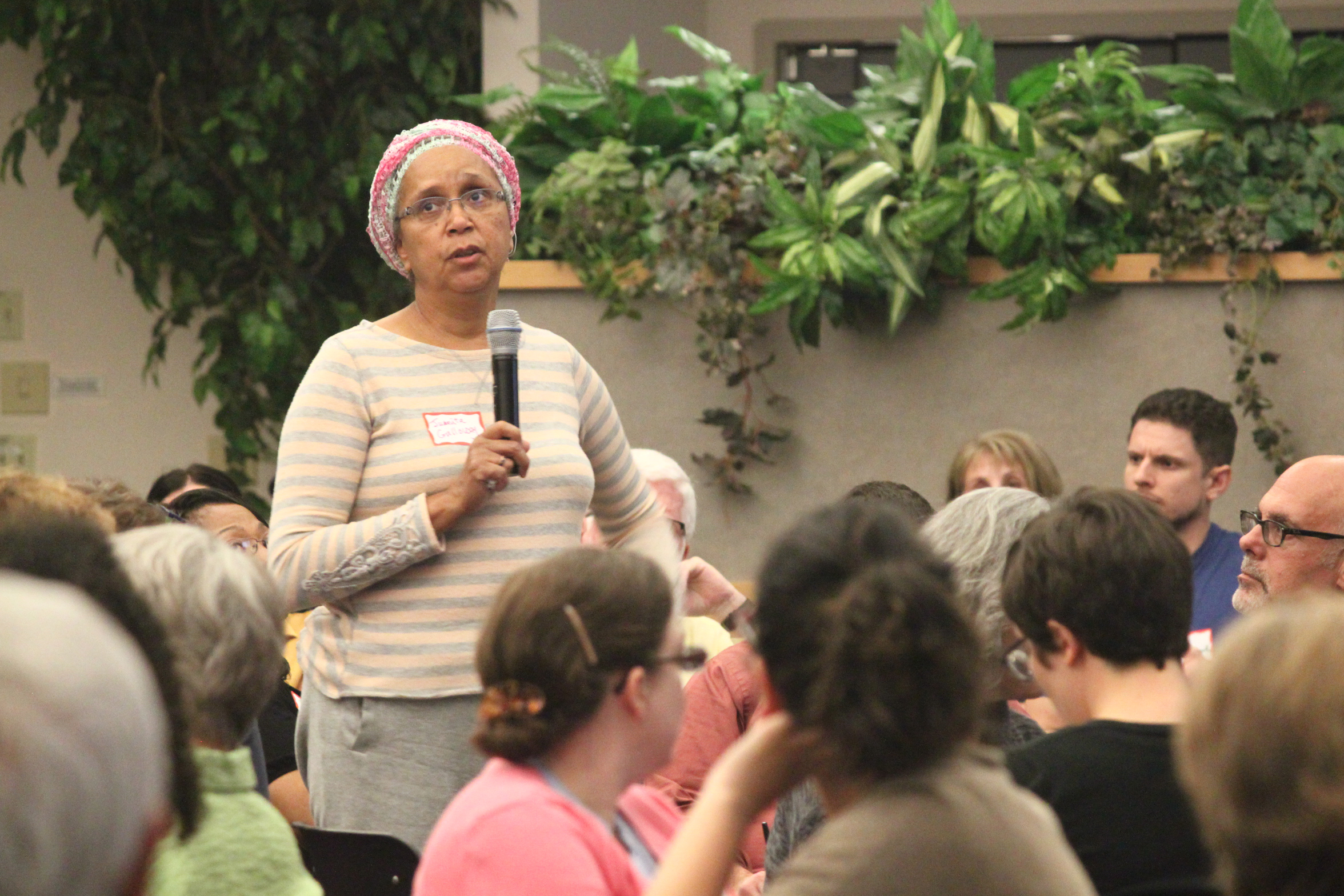
Seattle Times Education Lab shares insights from how it engaged the community in its coverage of school discipline
Sharon Pian Chan is director of journalism initiatives at The Seattle Times. Photo above: Members of the audience interact with one another during a small-group discussion at an Education Lab community conversation, “Discipline that works for all,” at South Seattle College on May 20, 2015. (Leah Todd / The Seattle Times)
This is how a big story usually happens at a news organization: A journalist spends weeks researching and developing the story, days writing it. As soon as the story is published – at the exact moment the community starts getting excited about the topic – the reporter moves on to next story.
The goal of Education Lab, a partnership between The Seattle Times and the nonprofit Solutions Journalism Network, is to turn this start-stop pattern into a virtuous cycle that connects journalists and the community. Our journalists look for ways to extend and deepen the community conversation sparked by the reporting, so that the community conversation can shape and feed the journalism.
Earlier this year Education Lab reporter Claudia Rowe began reporting on alternative approaches to school discipline, as awareness grows that suspending kids often does more harm than good. She did in-depth research and interviews on a promising approach called restorative justice, in which students who break the rules aren’t kicked out of school but are forced to reckon with the harm they’ve done.
Education Lab, started with funding from Knight Foundation and the Bill & Melinda Gates Foundation in the fall of 2013, is an experiment to test whether journalists can create solutions-oriented discourse by exploring remedies for the most urgent challenges facing public education.
Rowe didn’t stop with one front-page story. She kept probing deeper in a series of stories that ran online and in print over several months. Education Lab also invited guest writers to contribute op-eds on the topic.
Our community-engagement editor, Caitlin Moran, and education editor, Linda Shaw, thought strategically about how they could extend the conversation that these stories sparked. Rowe said she interviewed so many smart, dedicated, passionate people working on the issue of discipline – wouldn’t it be great to get them all in a room?
In early May, the editors and reporters invited 35 people – parents, teachers, education leaders, students – to a daylong unconference to discuss how schools can make discipline work for all. Forty people spent their Saturday at the event. Peggy Holman of Journalism That Matters facilitated the event using a framework called Open Space Technology. Here are some of the takeaways attendees wrote on notecards and shared at the unconference.

Photo: Juanita Galloway, a retired teacher and grandmother of two, speaks during “Discipline that works for all,” an Education Lab event at South Seattle College on May 20, 2015. (Leah Todd / The Seattle Times)
Education Lab carefully avoided advocating for any particular approach. The goal was to leverage The Seattle Times’ credibility as a news organization to create a neutral convening space for leaders to discuss an important education issue.
A few weeks later, Education Lab invited the public to “Community Conversation: Discipline That Works for All” at South Seattle College. On a weeknight, 250 people showed up to hear a school principal, students and teacher talk about their personal experiences with discipline. The large audience was divided into smaller group discussions using a World Café approach that Holman again facilitated.
Education Lab continued the conversation online in June with a live chat featuring our reporter Claudia Rowe, an education leader and advocates.
Education Lab editors invited everyone who attended the events to join a Facebook group to continue the conversation. That paid off with an exclusive story tip a few weeks later: The Seattle School Board was considering a moratorium to halt suspensions.
In September, the board voted unanimously on a one-year moratorium halting suspensions for elementary students who commit nonviolent offenses.
Many groups and individuals share the credit for this policy change. But we also believe that Education Lab elevated the conversation to a level where policymakers took notice. It connected parents, teachers, students and community leaders who were working independently on the issue through its online and in-person events.
Most importantly, Education Lab’s coverage anchored the discussion in a promising approach that showed strong results elsewhere, introducing a solution to an issue that could have become a polarizing debate about problems.
For journalists at Education Lab, the whole experience was an education in how journalists can deepen a conversation and extend the reach of their coverage without crossing the line into advocacy or activism. And that work of deepening the conversation fed the journalism that followed. That work was validated when Education Lab was named a co-winner for the Associated Press Media Editors’ first Community Engagement Award.
In fact, The Seattle Times believed this work was so valuable that it hired Caitlin Moran in August to join the newsroom permanently as a community engagement editor in the opinion section. She is now doing similar engagement work on issues such as elections, youth homelessness and housing affordability. The topics vary, as opposed to Education Lab’s singular focus, and it’s too soon to tell what impact it will have.
This community engagement work is a significant investment if a newsroom wants a full-time editor. For newsrooms who want to dip their toe in the water, consider a quick, cheap experiment. Create an engagement plan for a big project, such as a multipart series or investigative project that a newsroom might do once or twice a year. Some ideas:
· Create an ad-hoc team with a reporter, editor and a producer to organize an evening event featuring the reporter and key people featured in the story.
· Seek out a nonprofit partner that works with the community most affected by the story topic. Ask the partner to invite its network to attend.
Our biggest fear when Education Lab started these events was simply the fear of the unknown. We had never done it before, we didn’t know whether anyone would show up and we didn’t know whether people who showed up would have anything interesting to say. They do. But you will never know until you invite them.
Want to talk through ideas? All of our Education Lab reporters and editors would welcome your questions and be happy to brainstorm with you.
Email Sharon Pian Chan at [email protected] and follow her on Twitter at @sharonpianchan
Recent Content
-
Journalismarticle ·
-
Journalismarticle ·
-
Journalismarticle ·


